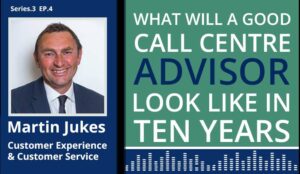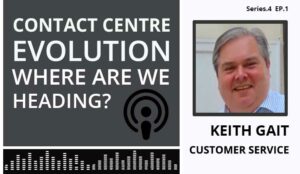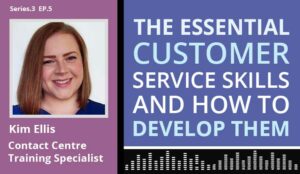The Contact Centre Podcast: Series 3 Episode 4
In this episode, Martin Jukes, a highly experienced consultant in all areas of customer service and the customer experience, shares his vision of the contact centre advisor of the future.

As part of our discussion, we also talk about the new complexities of working in the call centre, how managers should be reacting to that and the key advisor skills that will become increasingly valuable to your organization.
To listen to the podcast directly from this web page, just hit the play button below:
The Contact Centre Podcast – Episode 16:
What Will A Good Call Center Advisor Look Like In Ten Year’S Time?
To read the article discussed in the podcast, click here.
This podcast was made possible by our sponsor, Genesys.
Podcast Time Stamps
- 02:04 – The more complex advisor role
- 13:00 – Supporting the modern advisor
- 08:51 – Creating contact centre specialists
- 11:38 – The rising advisors salary
- 15:33 – 24 Hour Service expectations
Here is a Transcript of the Podcast
Charlie Mitchell: So, with self-service taking up much more of the transactional contact reasons, will the role of the contact centre advisor become more complex, do you think?
Martin Jukes: Yes, I think it will, Charlie. I think its complexities is one of the changes, but I think that generally what we are thinking we will see is that there will be a lot more transactions, interactions that are delivered through self-service and automation, and predominantly those being the simpler ones. So where you start to get more complex requirements or where things don’t run as smoothly as possible… as you would like, then that’s the opportunity then for the customer to contact the contact centre and enable them to focus on delivering probably a different type of service. I think it’s going to be more solution-driven, rather than just providing an answer or just completing a transaction. So that’s something that’s quite exciting, I would hope, for some advisors.
I would just say, though, it’s not only the self-service that’s going to create the change. I also think that the type of services that organizations are delivering now are more complex, and whether that’s through integrated technology or various components of an interaction or a transaction, it could be a wide range of things.
You look at buying your groceries online, there’s often the need to do something of that nature. I think most people now are buying more and more that’s delivered and there’s issues with deliveries that need an extra contact to sort things out. So, I definitely think that the role will be changing, and also the role of the organization itself as it changes. So, from a contact centre I also see the future being one that’s quite rich.
A number of people that I’ve read in the past have predicted that self-service and automation is the end of the contact centre. I think it’s actually another stage of evolution, and I think contact centres will be starting to do more and more of the end-to-end service.
So, whereas for some, traditionally they’ve done the introductory elements of an enquiry and then passed it to somebody else, I can see them being more and more involved in the end-to-end service and taking over cases and creating the fulfilment required for that service requirement.
So some quite specific changes, and I do recall a number of years ago I was involved in setting up a second-line technical support function for a mobile phone operator, and what we found there was a real need for different skills, because they were dealing with different enquiries of a more complex technical nature, and the attributes and competencies of the people that were best suited for that were slightly different from those on the frontline service.
Charlie: Yes, lots of great points there that I should pick up on, but the first key point for me is that what seems is going to happen in the future is that average handling times are going to increase and increase and increase. So how do you think we should be reacting to that within the call centre?
Martin: Well, I think they will increase, but I think they’ll be less driven. I think organizations will become less driven by an average handling time and more driven by the solution and the outcome. So I see, definitely I can foresee longer average handling times.
There may be circumstances where the customers are creating a shorter average handling time because they just want some clarification, but overall, I see a longer average handling time and a different environment, a completely different environment for contact centre advisors to work in. So potentially with them being a little bit more self-managed, being more focused on controlling the pace that’s comfortable for themselves and for the customer. So a little less racing through interactions and actually making them better paced, which sort of leads me to feel actually the occupancy issue that we’ve seen in the past may not be so much of an issue in the future. Because there’ll be less stress associated with those particular jobs.
I do think there’ll be a need for different roles or team leaders. I think they’ll need to give frontline advisors greater responsibility for their own workload and greater accountability for that, and I also think there’s a need for more training and creating different behaviours as much as anything else.
Charlie: Yeah, I think it’s something that we’re seeing more and more in contact centres now, moving away from adherence-based cultures and trying to work on that environment, as you say, to make it more self-manageable for advisors. And I think that’s a very key point, as well as maybe the occupancy, how we should, if handling times are increasingly increasing, maybe we should step back a little bit and give advisors more time in between calls to refocus on the next one.
I think there’s also a key point there about where contact centres will invest in more support for advisors. Do you think maybe they’ll look at technologies as well to help with that, such as maybe chatbots for assisting agents? Not necessarily customer-facing chatbots, but to help give advisors the right answers?
Martin: Yes. I think one of the key skills in the future for advisors, will be not necessarily having all of the knowledge themselves, but understanding where to go to get the knowledge. So I still think that we’re going to live in a world where multiskilling creates efficiency, and okay, there’ll be some specialist product knowledge for some people, and I still think there’ll be second-line support or escalation routes.
But overall I think one of the key things for contact centres in their future strategies is how do we make sure that all of the knowledge that this person requires is available to them in a format that’s easy for them to use and easy for them to translate into customer-friendly terms and enable them to deliver a solution?
So yeah, sourcing that knowledge is really important, really, really important, and having the right attributes, as I say, to go and find it. One of the things that always surprises me with knowledge, and I still see it today in some contact centres, particularly with self-service and automation. They provide more information and knowledge to their customers than they do to their frontline staff, which is ridiculous really, because that’s the port of call when customers don’t manage to do things themselves, is those frontline staff.
Charlie: I think there’s definitely more and more focus now as well going on knowledge management and ensuring there’s a knowledge manager who is regularly reviewing and updating those knowledge articles. And I think that’s a great topic for us to maybe focus on a bit later on, but you mentioned multiskilling earlier in your article and that’s one area that I really want to focus on now.
Do you think contact centres will perhaps… I was thinking that maybe they would move away from multiskilling in order to create specialists in different areas. I don’t know what your thoughts are on this.
Martin: Yeah, I suppose that all contact centres are different, and the services and products and whatever is all different. So there’ll be some variation, and what we predict isn’t going to be right for all.
Overall, I see that if you enable people and you give people the right training and the right skills and access to the right knowledge, they can start to do more and more and more.
So in that perspective, you need to be able to spread that work experience across as many enquires as possible, and I’m thinking particularly around where enquiry times are quite low, but you still need to provide some of them. Being able to access the full port of knowledge is going to be really important. So I do believe that multiskilling will still be paramount.
Charlie: I think it’s interesting as well how it links into the earlier point that you were making about creating the right environment. Do you maybe see solutions such as a unified queue? So advisors are still working on different channels, so they’re multiskilled in that way, but it’s all coming through to them in a better way?
Martin: Yes, so I think that’s important. I think I’ve always felt as though there are differences in channels and the way they should be handled. But I think, again, that’s another skill for the future in terms of having a multiskilled agent that’s multiskilled not only in the products and the services and the enquiry types, but also in the channels that they’re managing and supporting.
So yes, bringing that information together in that timely manner, in a fashion where they can deal with multiple enquiries if necessary, is going to be quite challenging, but quite rewarding as well, I think. And I think we’re looking at, what I foresee is that in the future, advisors will perhaps be a little bit more highly regarded, a little bit more well-respected and possibly regarded as being more of a career than a role.
So I see lots of organizations where they talk about how people go into the contact centre as their first role in that organization, and then move through to the rest of the organization. What I see in the future is possibly a reversal of that, where people are starting to actually aspire to work into our contact centre because conditions are much better, the role is much more interesting, it’s a different level of pressure. It’s developing solutions for customers and generally a more interesting role than it is at the moment.
Charlie: Absolutely. I think that’ll be music to many people in the contact centre industry’s ears, there, and that point links in very well to the next question which I wanted to ask, and that was with the advisor role potentially becoming more complex, do you think we’ll have to start paying advisors more?
Martin: I think so. I would like to think so. It’s always amazed me how organizations will really present a strong brand, but then they’ll put their lowest-paid staff on the frontline, facing customers. So I think as organizations start to change and understand their interactions with customers more, then they will need to start paying. Of course it will be driven by market forces and competing opportunities for advisors, which could well increase the rate, but I think what I’m talking about here and what I’m predicting is that there’ll be a different type of advisor in the future that will be demanding a higher salary because they’re delivering a more solution-driven service rather than just delivering a response.
So from that perspective, I think it’ll be well warranted and well deserved, and hopefully start to attract and retain really good people, because I see so many really good people in the frontline of contact centre services that don’t stay because the monies aren’t very good or the conditions aren’t very good or because it gets a little bit repetitive. Real missed opportunities for these organizations with people. So maybe there could be less people in the future and if we can reward them better and retain them, then we’re saving an enormous amount of overhead.
Charlie: It’s quite interesting actually how that position will change. Maybe it becomes more of a definitive career option for people, and one thing I was thinking about recently, will the name change itself from a contact centre advisor to maybe something a little bit jazzier with more impetus, so it reflects that change?
Martin: I think so. I think that’s part of attracting the right people to a particular role, isn’t it? Having a different job title, I think, for some people it doesn’t matter at all, but I think actually when you’re advertising vacancies, then having an attractive title does make a difference and gives people some more pride in what they do.
So yeah, I think there’s always been quite a lot of creativity with regard to trying to make job titles more exciting. I think that will continue, but I think the role will become more exciting as well.
Charlie: Yeah. I can even see the name of the contact centre changing itself. I’ve heard that certain organizations call it the customer experience hub. Is this something that you predict changing more?
Martin: I think it will. I think that’s about creating some freshness as well, isn’t it? And relaunching services by rebranding and giving them different names. Yeah, I think they’re … I’ve seen solution centres, lots of different names for different services, and I think that just creates a little bit more of a level of interest in where people work. I think for many people, they talk with pride about where they work and the job they do. So I do think that the name needs to evolve with time and become more modern. You know, we’ve had … a few years ago it was call centre, everything was call centre. Now it’s contact centre, but there’s so many variations on contact centre that I think it’s just going to continue to grow.
Charlie: Yeah. I think the one that particularly I know ‘customer experience hub’ is something we’re all now hearing about the customer experience as a collection of different customer service touchpoints, but the customer care one particularly sticks in my mind as we’re talking here about advisors taking longer, more difficult calls, and that’s potentially with the even more emotionally engaged customers. So that was one idea that I really liked. But moving onto another point now, do you think contact centres will come under pressure from their customer base, maybe to move to 24-hour service as that’s becoming a bigger expectation of our customers?
Martin: Well, I think as products and services change and the offering to customers changes, then yes it will in some circumstances. So, for example, if you look at a bank that supports app-based transactions only, they don’t allow telephone banking, they don’t promote telephone banking, they don’t service telephone banking, but they do provide a backup service for people who are struggling to use their app.
So if you use that particular example, if you’re going to a cashpoint to withdraw some money for an evening out, you need to be able to speak to somebody if there’s a problem. So I think the strengthening and improvement of the customer offering will definitely introduce a greater demand for 24-hour service, or if not 24-hour service, an extended service. So some things are becoming so dependable and so needed now that we want to be able to speak to somebody straight away when something’s not working.
Charlie: It brings me to another point actually on staff scheduling, in terms of how do you think that could possibly work? Do you think that contact centres would look for a dedicated night staff and do you think it would be difficult for them to look for people to fill that role?
Martin: Well, I have quite a lot of experience in 24-hour services, and there’s different trains of thought with this. I think there’s one train of thought that says, actually, we should just rotate people, and then that makes sure that everybody feels part of the organization; we don’t start to have individual cultures and those sorts of things. The other train of thought is actually if people don’t want to work nights, they won’t apply for those 24-hour positions. So you may be missing out on having good-quality people, and the opposing view is that some people are happy to only work nights and they’re very good at it. I think that those shifts … different shifts have a different sort of experience for the advisor, and I think that working throughout the night, for example, there’s generally fewer people there and it’s a different sort of environment and heritage than the daytime, where the rest of the organization is around and supporting the contact centre. So I think my personal view is that I think it’s very difficult to recruit a large number of people on the basis that they’re going to work 24-hour shift patterns, and I think there are some people that in the same way that some people don’t want to work nights, some people only want to work nights, and if they’ve got the right skills and the right competencies, why would you make their life difficult for them?
Charlie: I think the key there is to create shift patterns and recruit for certain types of lifestyles. I think that’s a very key point, and I think as we’re talking about the advisor role in the future, I notice that maybe the expectations of new members of the team, young members of the team don’t necessarily want to work that traditional 37-and-a-half-hour week, with maybe five days a week as well, because I went to a contact centre recently and they created loads of different shift patterns and they said to their advisors, “Which ones would you most like to work?” They actually said the 37-and-a-half-hour week, but only on four days instead of the five days. Do you see a lot of changing preferences like this and do you think that will influence future shift patterns too?
Martin: Yes, I do. I’m seeing that more and more, more around lifestyles, as you’ve said. So I think the advisor of the future is, of course their lifestyle is based on more and more organizations and services being available throughout different times. So 24-hour shopping, that sort of thing. The key with a lot of this is trying to ensure that you can attract and retain the best people to work for your contact centre. So I think there needs to be flexibility to do that. I certainly find – I’ve been doing quite a lot of work recently in terms of looking at resource planning, and when I ask for shift patterns, I’m getting more and more organizations that send me individual shifts based around individual people. Whilst we all talk around, well, that doesn’t always fit the needs of the business, if it’s attracting and retaining the correct people and good-quality people, then maybe that is meeting the needs of the business.
Charlie: Yeah, I think that’s certainly another interesting area to look out for in the future, and we’ve discussed many of these areas today, but are there any other ideas that you have in terms of how else the contact centre advisor role might change in the future?
Martin: I think the … well, we’ve talked a lot about the advisor role. I haven’t really talked around the team leader and the management role, and I think they will change. I think there’ll be more technology to support them in terms of managing people. I think the advisors… I talked around how I see them being a little bit more responsible and accountable for their own workload and their own outcomes and their own performance.
So I see the role of the team leader changing to perhaps be a little bit more around motivational and supporting and ensuring that any issues are resolved much faster, but maybe in more of a supportive than a managerial role in the future, which is quite a change. I think that’s quite a mindset for team leaders to think around as well.
Some team leaders that are in place at the moment I don’t think would necessarily make them suitable team leaders in the future because of that change, because they’re very, very good at managing performance, but they’re not necessarily as good at liaising with their team to be able to give them feedback and motivate and support them.
Charlie: Yes. It’s almost like the key skills that qualify a good team leader or manager will also change, and that’s an important area that we need to think of, and I guess all this, we’re talking about the future. This comes back to an old principle that the best advisors might not make the best leaders.
Martin: Oh, exactly. Very true. You look in sales environments, and the best salespeople don’t always make the best sales managers. And I think it goes back to – I managed a technical support team many years ago and it wasn’t a surprise to me when I first had that role to find out that many of the technical support experts with marketable skills were actually paid a lot more than I was as their manager, and I think that’s something that’s going to become more and more common. I think we see it in some areas now.
If we look at sport, for example. Sport is a good example of where sports people are paid substantially more than their managers at times. I think in technical support, that’s certainly been the case for a long time because of marketable skills, and I suspect that in contact centres and service delivery that will also be the case, because advisors will have a greater knowledge and capability and strength than perhaps the people who are leading them.
Charlie: It’s interesting, that idea. I think we spoke of the fact that advisors in the future would be more skilled in a few main areas there, and one of those is communication and the other is technology and one other is working across different channels. I remember you wrote an article with us a little while back for Call Centre Helper, where you said that you think advisors … we might look into advisors’ skills and solution development too. Is this another area that you think advisors might be leaned on more and more?
Martin: Yes, I think they will, and I think a number of things. I think adding to the communications skills. I think having empathy with the customer will become more and more important. So again, going back to my experience of managing technical people and technical teams, is they’re often very, very good at being able to solve a problem and resolve an issue, but they haven’t always been good at understanding the impact that that has on the customer or necessarily being able to communicate it well with the customer.
A lot of people will understand the picture I’m going to paint about if you have a problem with your PC and somebody comes along and they sort of just take over for a minute and it’s clickity click, click, click, click, click. A few stabs at different buttons and it’s fixed and they’re off, and you don’t know what they’ve done, you don’t know the impact, and invariably something else goes wrong later and they come back and they clickity click, click and change it again.
So I think there’s a need for greater communication, greater empathy with the customer, and to become more empathic in terms of dealing with that customer from that situation.
Charlie: Absolutely, and I’d have to agree that those four areas of communication, technology, working across different channels, and solution development are key, but right now content centres are focused on providing great service at one specific customer touchpoint. Do you think that advisors over time will become more educated on the wider customer experience as well as what they are focused on now?
Martin: So I’ve talked mainly about the behavioural side of advisors. I think that the knowledge and the capability and the technical competence – and technical doesn’t have to mean about IT, it could well mean any level of service – but that knowledge about that service is going to be more and more important. And where I talked a little bit earlier about the role of the contact centre changing, I see more and more of that knowledge that the advisors are obtaining from that process being valuable to the rest of the organization. So more and more work in service and product development taking place within the contact centre, and the rest of the organization coming to the contact centre for that knowledge, information experience, and expertise. So a very exciting future.
Charlie: I think that’s a really a nice and positive note to end on there, Martin. I think we’ve gone through lots of great ideas today, but is there anywhere where our listeners can make sure they keep up to date with any more of this information and any more content that you might bring out in the future?
Martin: Yes, there’s a website, www.mpathyplus.co.uk, so that’s empathy without an “e” on the front, where there’s frequent blogs, articles that we place there, and some various thoughts there. Martin Jukes on LinkedIn or you can always give us a call from the details on our website.
Charlie: That’s all for this episode. Thank you to, Martin, for joining us today.
Author: Jonty Pearce
Published On: 10th Feb 2020 - Last modified: 26th Sep 2025
Read more about - Podcasts, Charlie Mitchell, Genesys, Martin Jukes, Podcast















